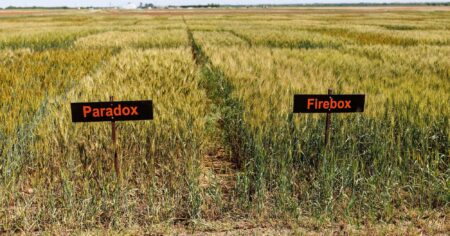By Ainsley Platt
Arkansas lawmakers passed a handful of bills during the 2025 legislative session to address environmental concerns, such as the application of industrial biosolids to farmland and a moratorium on medium and large swine farms in the Buffalo River watershed.
Rep. Brad Hall, R-Van Buren, rallied legislators to pass Act 1009 overwhelmingly in both chambers, after months of complaints by Crawford Country residents of noxious odors from a waste lagoon and fields where Denali Water Solutions, a waste disposal company, stores and applies waste from chicken processing plants to farmland as fertilizer.
The bill requires the Arkansas Department of Energy and Environment’s Division of Environmental Quality to levy the maximum penalty allowed under state law when those permitted to apply industrial biosolids either over-apply or apply industrial biosolids near a rain event.
It also authorizes DEQ to write rules specifically “to authorize no-discharge land application permits of industrial waste.”
Hall said he made it clear to company representatives that the odor from its operations, which he described as smelling “like death,” was unacceptable to him.
“I’m tired of people living like that,” Hall said. “It’s ridiculous. I mean, it’s obscene. They [Denali] don’t have to live like that where they live, so they shouldn’t expect everybody else to live like that.”
Hall’s bill went through numerous substantive amendments. Its final form, he said, was prompted because Denali promised it would shut down the open-air waste lagoon in Crawford County by Jan. 1, 2026.
A Denali spokesperson said they “have not committed” to a specific shutdown timeline.
“The Crawford County storage facility remains a critical storage asset, particularly during periods of inclement weather when land application is restricted,” Denali spokesperson Nancy St. Pierre wrote in an email. “Denali will continue to use the site through the remainder of 2025 as we work to continue developing alternative storage capacity and long-term infrastructure solutions throughout the region.”
St. Pierre said obtaining permits and permit modifications from DEQ were “critical” in order to shut down the lagoon.
Hall said “you better have your popcorn ready” if Denali doesn’t abide by the agreement he said they made and the situation has to be addressed again during the 2027 legislative session.
DEQ fined Denali $19,800 earlier this year after numerous incidents where the company was documented applying waste to farmland within 24 hours of a rain event — defined as when there is a 50% chance or greater of precipitation.
Such application practices are prohibited in the company’s permits. A letter last year from Denali to state regulators stating its intent to violate its permits to apply during those periods while self-imposing requirements on itself earned a sharp rebuke from the head of DEQ’s Office of Water Quality, Stassie Wassel, who wrote that Denali had “a duty to comply” with the requirements “explicitly set forth” in its permits.
“DEQ does not recognize the legitimacy of ‘self-imposed requirements’ and will not rely upon any assertions from the May 8 letter as mitigating factors for future enforcement actions relating to non-compliance on behalf of Denali,” Wassel wrote in a letter dated May 2024.
Buffalo River Permit Moratorium
Perhaps the most visible piece of environmental legislation that made it into law this year was Senate Bill 290, now Act 921.
SB 290 in its original form would have stripped away a decade-old moratorium that prevented medium and large concentrated animal feeding operations, or CAFOs, from obtaining certain water permits necessary to operate within the Buffalo River watershed, while setting new hoops for agencies to jump through if one wanted to institute a watershed-based permit moratorium in the future.
Aided in their cause by Gov. Sarah Huckabee Sanders, Buffalo River advocates expressed relief that the final form of Act 921 ultimately preserved the moratorium for the Buffalo watershed in its current form.
They also said that it never should have reached the eleventh hour the way it had.
“We were pretty crestfallen after the three heads of three state agencies got in there and had their say, and in spite of that, the committee still voted to support SB 290 before it was amended,” said Gordon Watkins, president of the Buffalo River Watershed Alliance. “And then we were, needless to say, we were happy to find out that the governor subsequently stepped in and twisted some arms and amended it to a more acceptable level.”
Even with the protections for the existing moratorium, Watkins said his organization is still opposed to the legislation as a whole. He said he felt “sorry for the rest of the state that’s going to be under these onerous requirements” if other watersheds end up needing a similar moratorium in the future.
Thompson also emphasized that his organization was “extremely grateful” to Sanders for her role in preserving the existing swine farm moratorium.
“It was a tough position for her to take,” Thompson said. “Still though, the fact that the agencies will have to jump through additional hoops down the road is unfortunate, but we did get a big part of what we wanted, so we were pleased. We owe it to the governor.”
Other Environmental Laws
- Senate Bill 427 / Act 945 of 2025: Sponsored by Sen. Bart Hester, R-Cave Springs, and Hall, the act creates the Arkansas Wind Energy Development Act, “to minimize any adverse effect upon the environment” or upon Arkansans’ quality of life as a result of wind turbine construction, operation and decommissioning. It creates a requirement that the construction, operation, or redevelopment of a wind turbine be permitted by the Arkansas Public Service Commission and local governments if there are specific local regulations regarding wind turbines.
- House Bill 1681 / Act 812 of 2025: Sponsored by Rep. DeAnn Vaught, R-Horatio, and Sen. Joshua Bryant, R-Rogers, the act creates a matching grant program for water and sewage utilities for use in infrastructure and improvement projects. Vaught has been vocal about the deterioration of utility infrastructure, especially in rural areas of the state.
- Senate Bill 421 / Act 578 of 2025: Sponsored by Hester and Rep. Howard Beaty, Jr., R-Crossett, the act reauthorizes the Arkansas Natural Resources Commission to borrow money via general obligation bonds “for the development of water, waste disposal, and pollution abatement projects.” The measure will require approval by voters either during the 2026 general election or via a special election called by the governor before bonds can be issued.
Arkansas Advocate is an affiliate of States Newsroom, the nation’s largest state-focused nonprofit news organization, supported by grants and donations. The Advocate retains full editorial independence.



:max_bytes(150000):strip_icc()/heatherlibrary-90ea3b4777294b008ffd3f817bf229d5.jpg)
:max_bytes(150000):strip_icc()/2308-01-097_pigs-b0529b97e3e943d392b7014aee9eb4f5.jpg)


:max_bytes(150000):strip_icc()/2458520spreadin20fertilizer-2000-de69fa45a10b46f1ab24bca3d63efb76.jpg)
:max_bytes(150000):strip_icc()/DC-5ec71dd349104ec287b318f05ebf5f74.jpg)
:max_bytes(150000):strip_icc()/SFCE_Sp25_WortheyFarmersMarket_preview1-9c3c0b2c5e9444249fa60594b7f30fec.jpg)
:max_bytes(150000):strip_icc()/TaylorsFireworkssign-c3dd3eb41cc646c593dbebfee850bdc0.jpg)
